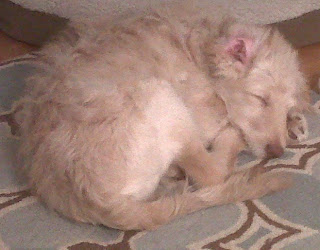Last Tuesday I neutered Frank, all went well and he was completely unfazed by the event. He had a few baby teeth remaining along with his adult teeth. This is very common, especially in small breed dogs. Since these should have fallen out by now we removed them while he was under anesthesia.
I also manipulated his hips while he was asleep to see if there was any abnormal mobility that could lead to arthritis in the future. At Friendship we recommend that all large breed dogs have an x-ray taken at this time so we can visualize the bone structure of the hips. Frank's hips felt a little loose but appeared normal on the x-ray which is good. In order to protect his joints I have switched him to a puppy food that has glucosamine and chondroitin which help maintain healthy cartilage. As with all my animals he will also continue to receive a fish oil supplement which helps with not only joint health but just about every other body system.
As this is the end of Frank's routine puppy care I thought it would be a good time to review the three very best things you can do for your puppy.
I also manipulated his hips while he was asleep to see if there was any abnormal mobility that could lead to arthritis in the future. At Friendship we recommend that all large breed dogs have an x-ray taken at this time so we can visualize the bone structure of the hips. Frank's hips felt a little loose but appeared normal on the x-ray which is good. In order to protect his joints I have switched him to a puppy food that has glucosamine and chondroitin which help maintain healthy cartilage. As with all my animals he will also continue to receive a fish oil supplement which helps with not only joint health but just about every other body system.
As this is the end of Frank's routine puppy care I thought it would be a good time to review the three very best things you can do for your puppy.
1. Bring your new puppy to the veterinarian right away – All puppies should come with a health record of vaccines and de-worming medications administered by the breeder or shelter. On your first puppy visit be sure to bring this paperwork, so you and your veterinarian can discuss and plan out an appropriate vaccine schedule. In addition, a poo sample is helpful so your veterinarian can make sure your puppy didn’t bring home any unwanted friends (internal parasites) with him. At this first visit you can get your puppy started on preventatives for heartworm, fleas and ticks.
2. Take your puppy to basic training class – All veterinary behaviorists agree that early socialization is a crucial step in creating a happy and well-adjusted dog. Exposure to other puppies, new people and places can help prevent your puppy from being fearful and socially awkward. Puppies need to be taught how you want them to behave; a training class will give you proper guidance on how to achieve this. An added benefit: letting your youngster run around and play with other puppies is a great way to work off some of that crazy puppy energy!
3. Spay or neuter your puppy – I cannot stress the importance of this enough. In my opinion, spaying or neutering is the single best thing you can do, not only for your own dog but for the millions of homeless animals living in shelters. Along with eliminating the chances for many types of cancer developing, spaying and neutering can prevent many behavior issues. I have said it before and I will say it again: female dogs in heat are messy and it is always embarrassing to have your male dog humping someone’s leg.
I hope these tips help you give your new dog a great start to a long and healthy life with you. For more puppy tips please visit the Polite Puppy website.
I hope these tips help you give your new dog a great start to a long and healthy life with you. For more puppy tips please visit the Polite Puppy website.











No comments:
Post a Comment